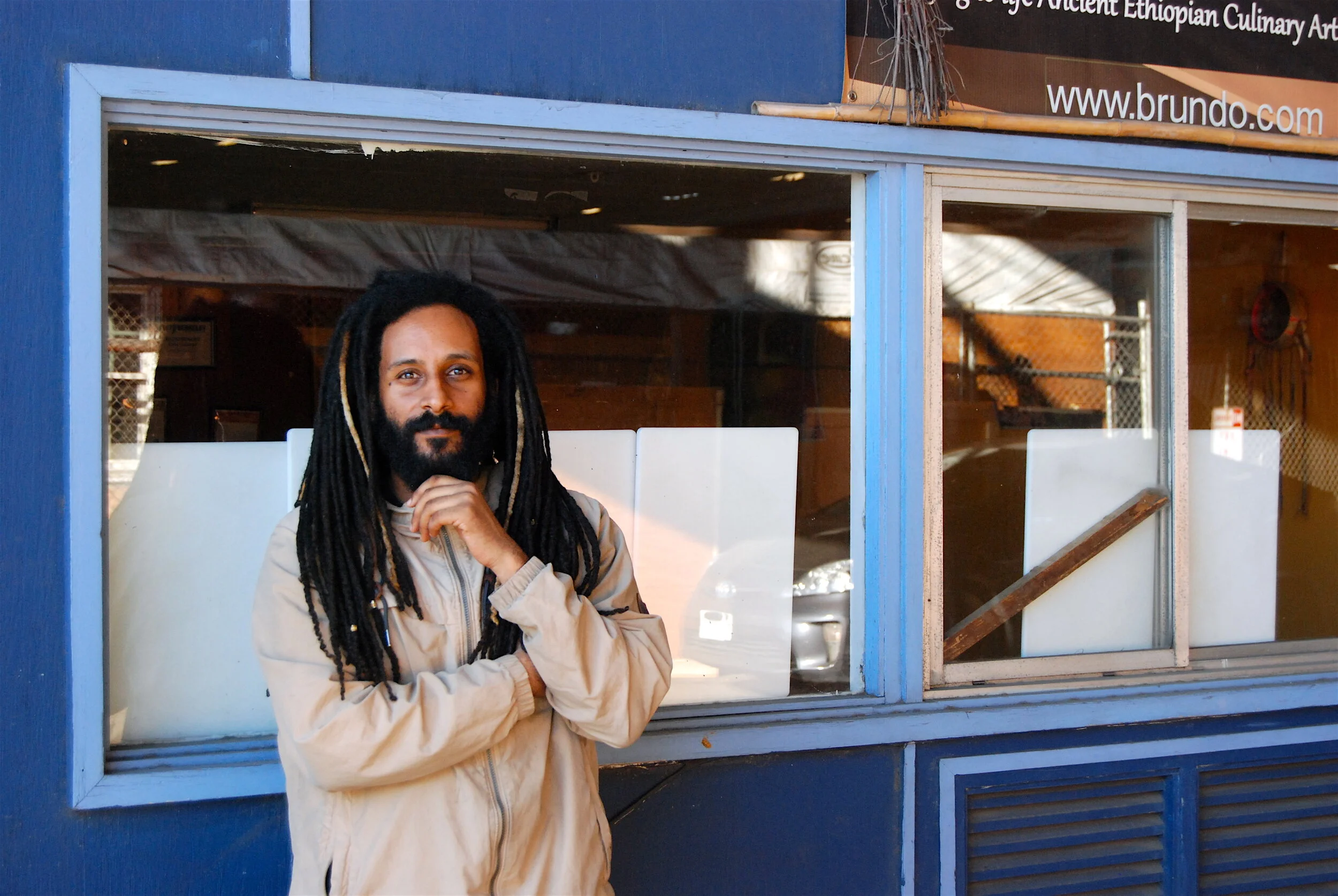West Oakland, California
Back in the carefree days before coronavirus, I happened upon an Ethiopian cooking school called the Brundo Culinary Studio – tucked away in the corner of a grey, expansive warehouse on Mandela Parkway – during a morning walk.
Several weeks later I returned to take a class with Daniel Aderaw Yeshiwas, an Ethiopian-American entrepreneur, who familiarized our small group with Ethiopian classics like messer wot, a lentil stew spiked with spoonfuls of berbere, a complex spice blend (“cinnamon, a little bit of clove, and about 14 other things,” Daniel explained), and shiro wot, a chickpea flour dish with a hummus-like texture, which he described as “a very staple dish, like a Tuesday, Wednesday night dish”. These fragrant, comforting plates were eaten with relish alongside spongy, sour injera bread and Ethiopian honey wine.
But perhaps the best part of the lesson was hearing Daniel speak passionately about his love of Ethiopia and his family’s food history, including the story of Cafe Colucci, an Ethopian cafe in north Oakland started by his aunt almost 30 year ago, when it was one of only a tiny number of Ethiopian restaurants in the East Bay.
Today the restaurant is a fixture of the neighborhood, and Daniel is working hard to grow a thriving import side to the business called Brundo Spices, which brings spices directly from Ethiopia and sells them both online and in a shop next to the cafe. It was astonishing to hear how much effort Daniel and his family had gone through to bring these unique ingredients to Oakland, a process that involved establishing their own spice-processing warehouse in Ethiopia and navigating years of US customs red tape. But once you taste them, it’s pretty obvious why it’s all been worth it.
I was in the process of writing up a story about the class when the coronavirus hit, so I checked in with Daniel again to see how the businesses were coping. Cafe Colucci, like so many other restaurants, had been forced to make big adjustments, like bringing in outside delivery apps and temporarily letting go of staff. But it was encouraging to hear that Brundo Spices was actually handling things pretty well, even seeing sales go up, as more people turned to online shopping and home cooking. And Daniel’s optimism and enthusiasm that Brundo would weather the storm, maybe even emerge stronger, gave me a lot of hope.
‘We want to showcase and value what Ethiopia has to export’
Cafe Colucci officially opened in 1991. The story was that my aunt and my mom were working at American Express; mom was a bank teller and my aunt worked on the investment end. But my aunt wanted to start a cafe, a place where she and her friends could just kick it.
The first iteration was an Italian cafe. Both my aunt and mom had spent time in Europe before they came here, in Italy and France, and my aunt liked that Parisian kind of vibe of somewhere with pastry and coffee. Originally there was an Italian co-founder, and the idea was to do Ethiopian coffee with European-style pastries. They were also very early in doing “fusion” dishes, like hamburgers and meatballs made with Ethiopian spices.
Eventually the Italian co-founder left and my aunt maintained full control, and began transforming it into a more traditional Ethiopian restaurant. We do have one Italian fusion dish left, the “Polpeti” – an Ethiopian spiced meatball dish. But her vision became much more about the spices themselves. Some Ethiopians even say our food is too flavorful because we put this big emphasis on spices. We do something that packs more of a punch than people are used to.
I would say the biggest change in the last 30 years has been our focus on the importing of the spices themselves, and trying to showcase more of the food culture in Africa. There's not a lot of science and etymology that has been done on what products are heirloom or indigenous to the Ethiopian region. So seeing that knowledge gap and wanting to attack it, and wanting to use the restaurant as the vehicle for all these flavors that are inherent from spices that only come from Ethiopia.
“Ethiopian spices are typically made out of anywhere from between four to 18 different components”
We now have our own spice processing factory back in Ethiopia. It’s a large warehouse in a city called Modjo, about an hour outside of the capital. It’s a very beautiful, lush area. I’d say there are around 40 people that work there currently. The facility was founded by the same people as Cafe Colucci, and my aunt lives over there. We bootstrapped it to start it up, just with funds saved from Colucci and from friends and family.
Ethiopian spices, like berbere, are typically made out of anywhere from between four to 18 different components, so you have to get all those things and grind and process them separately. It is pretty time and labor intensive. And importing from Ethiopia to the US is really difficult, so people haven’t really been able to do that in the past. We want to showcase and value what Ethiopia has to export, but there is all this governmental BS that is not allowing Ethiopia and Africa as a whole to flourish, and for people to experience these goods. I’d say 95% of the importing business is just filling out paperwork.
It’s definitely been an uphill battle for us – it took us years just to get our first container of spices here because there were so many roadblocks from US customs. We first incorporated Brundo Spices in 2009 but it wasn’t until 2016 that we got our first container here. Customs has seized our products; they’ll go through all of it, opening bags, and you get charged rental fees for every day it’s held at the port. For instance we were recently seized for a narcotics check and had to pay $7,000 for the time it was stuck at the port. So you’re paying thousands of dollars for them to basically screw it all up and hand it back, ripped up and taped back together with government seals.
As well as all the administration, our bottling plant in Ethiopia needs about five to six month for milling, grinding and preparing the spices for shipping. Then it takes about a month to travel from Ethiopia to the port of Oakland, and then it might be on hold in Oakland for another month. So that’s the amount of work that’s gone into bringing a bag of spices here.
When the coronavirus shutdown happened, we closed down Cafe Colucci for a week just to kind of see what was going to go on. I would call the restaurant a legacy institution, it hasn't really changed in 30 years. I pulled up our numbers from before this happened and our business was like 85% dine-in customers.
So after a week off, we had to recalibrate. We got in all the apps – Grubhub, Doordash, Caviar, Uber Eats. We set up our online website to take orders, so people can also pay ahead and just come pick up. We also laid off employees so they could get unemployment while we navigate this unknown time. There was also a GoFundMe that went directly to the staff.
We worked with very limited staff, just one cook and one server, all to-go orders. After the first week or so, we were getting good traction. And then slowly, we started bringing more of the staff back. My big thing is that I wanted to be sustainable, I didn’t want to hire everyone back just to send them home again two weeks later. But you know, hopefully we continue to get busier and busier. Shockingly, we had a catering order come in yesterday, someone’s birthday at their house.
We’ve definitely had to adapt. I've had to cut some things off the menu, high end dishes that were just too expensive to keep producing – like lamb, seafood. And Ethiopian food is all about the presentation, the big shared platter. Now we’re stuffing everything into a single portion to-go box.
In the short term, being on the delivery apps is OK. But the apps, they take 20, 30%. It’s not a good deal at all for the restaurants. And I mean, none of these apps are within themselves a sustainable business model either. I think as time goes on they’re only going to continue to price gouge more and more as they try and figure out their own economics.
“I’ve Been Trying to stay positive. An advisor told me that when bad things are happening, Find something that can be played in your favor”
And then just losing the vibe – I used to love working on a Friday or Saturday night, the music was playing and people were in there having fun, and you're having fun. Now it's like the server is in there with their head on a swivel, trying to answer the phone and answer all these apps.
It’s interesting because all of this also started happening right when things were really beginning to skyrocket with Brundo. I’m in a business accelerator called Inner City Advisors (ICA), and it’s based at the Impact Hub in downtown Oakland. I’m doing a lot of fundraising right now, and the accelerator has opened doors for us in terms of access to investors and banks. In the past it’s been very challenging to get funding because banks are like, ‘You’re based in Africa? I don’t get it’. So I had been working so much on that back end and logistics stuff for the last year and a half. Then right around April, we started seeing this huge rise in sales, some of which was planned because the accelerator program has given us good PR, and we started doing some ad spend on Google and on Amazon. So we were planning for a small increase, but I think people sitting at home has been good for us too.
I’ve actually been trying to stay positive through this time. One of my advisors at ICA told me that when really bad things are happening, it’s about trying to stay afloat but also about finding something that can be played in your favor. Maybe it’s a market that wasn’t there before, or something that has changed because of the situation. For us, I think that’s e-commerce. Before we anchored so much of the business around the experiential – cooking classes, pop ups at farmers markets. All of these things were quite intensive, whereas e-commerce is more scalable. So I’m trying to keep the focus on the things that actually benefit us.
On a personal level, though, I’m actually quite an experiential shopper. So I do wonder what is suffering. At the restaurant level, I feel like Colucci is turning more into a commodity – cranking out as many packets of food as we can every hour. It’s taking some of the love and care out that we used to have, and I think people are going to be missing that so much. I hope it comes back.
• • •
Visit the Cafe Colucci website
Visit the Brundo Spices website
Photos taken by Feeder at Brundo Culinary Studio in West Oakland









